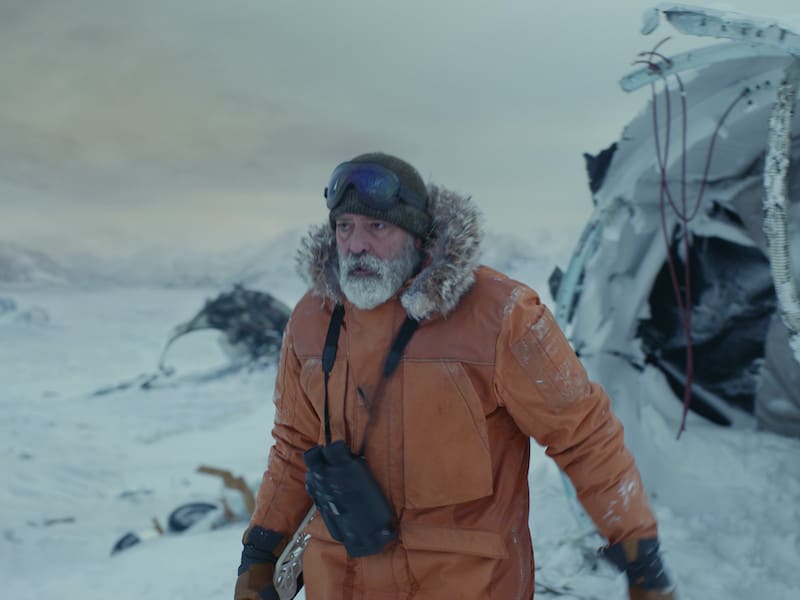
Regret, like muscle pain and memory loss, is an affliction most often worn by the older generations. Young people have no time for looking back as they’re too busy eyeing the future, but as the end of the world approaches it’s regret that powers one man’s hopeful redemption. The Midnight Sky offers up a post-apocalypse populated by grief, painful memories, and beautiful but lonely landscapes. Oh, and there’s also a very hungry polar bear.
The Barbeau Observatory in the Arctic Circle was once a thriving research station, but after a deadly radiation spreads across the planet everyone rushes home to die with loved ones. Augustine Lofthouse (George Clooney) has no one fitting that description, so he remains behind to die alone. He’s dying anyway and expects to be gone before the radiation reaches the North Pole, but he’s surprised by two signs of life. First, the Aether Space Station is returning to Earth’s orbit after years spent exploring a previously undiscovered moon of Jupiter that appears hospitable to human life, and Augustine’s voice is the only one they can hear from home. Second, the rush to evacuate the observatory appears to have resulted in a young girl named Iris (Caoilinn Springall) being left behind, and the chaos unfolding in the outside world means he’s stuck with her. “I can’t help you,” he tells her, “I’m the wrong person.” He’s not exactly wrong, but he’s also the only person.
Unlike many of its contemporaries, The Midnight Sky makes it clear from the outset that there’s no saving life on Earth. The planet is doomed, and instead the film finds its suspense and drama in just a handful of characters clinging to life and hoping to save the human species. Clooney, who also directs the film, and writer Mark L. Smith shift their attention back and forth between Augustine’s efforts on the ground and the astronauts above — he’s rushing to fix communication equipment to warn them away from Earth, and they’re facing struggles of their own. Both manage suspense, heart, and drama, some landing more successfully than others, but it works. It’s a slow burn overall, despite a handful of action beats, but viewers willing to invest their time and attention will find an attractive and affecting tale.
The earthbound stretches work best despite the flimsiest of attempts to conceal an impending “twist” from viewers — I’m not actually convinced Clooney and friends are trying to hide it, though, in part because being aware of it actually aids the drama and emotion in real and substantial ways. While Augustine and Iris face off against polar bears, wolves, illness, and hypothermia, the space station crew (which includes Felicity Jones, David Oyelowo, Kyle Chandler, Demián Bichir, and Tiffany Boone) deals with technological failures, meteor showers, and grief for the world and loved ones they left behind.
Less successful by a wide margin in The Midnight Sky are flashbacks showing Augustine in his younger days (played by Ethan Peck) as a cocky, focused scientist who first discovers the moon that might just save humankind. His relationship with a young woman, and the daughter he has no time for, are revealed to be his great regrets of a life lived too far up his own behind in pursuit of the stars. The scenes exist mostly to layer in a “reveal” that, while made explicit in the third act, is clear to anyone paying attention by the second.
Clooney shows a strong eye as a director capturing both the quiet, serene beauty of nature and the frantic energy of the film’s multiple life or death sequences. None of it feels showy, and instead he and cinematographer Martin Ruhe succeed across the board with the film’s visual composition and effect. Alexandre Desplat‘s score does even more of the heavy lifting as it finds beauty in the wonder, awe, and sadness enveloping the film. Clooney and his cast deliver the expectedly strong performances starting with his own understated and affecting turn as a man beaten down by his reflections on the past who’s struggling to make amends before it’s too late.
The Midnight Sky offers a quiet glimpse at an apocalypse of our own doing. Augustine was too late in acknowledging his own family, but the crew above, a family of another kind, is still fighting, “You discovered so much up here,” they tell him, but he can’t stop thinking about how much he missed down on Earth. The film’s duality, in both its structure and themes, is more of an observation than a path towards redemption, but sometimes recognizing the truth is every bit as important as resolving it.
Related Topics: George Clooney, Netflix, The Midnight Sky
